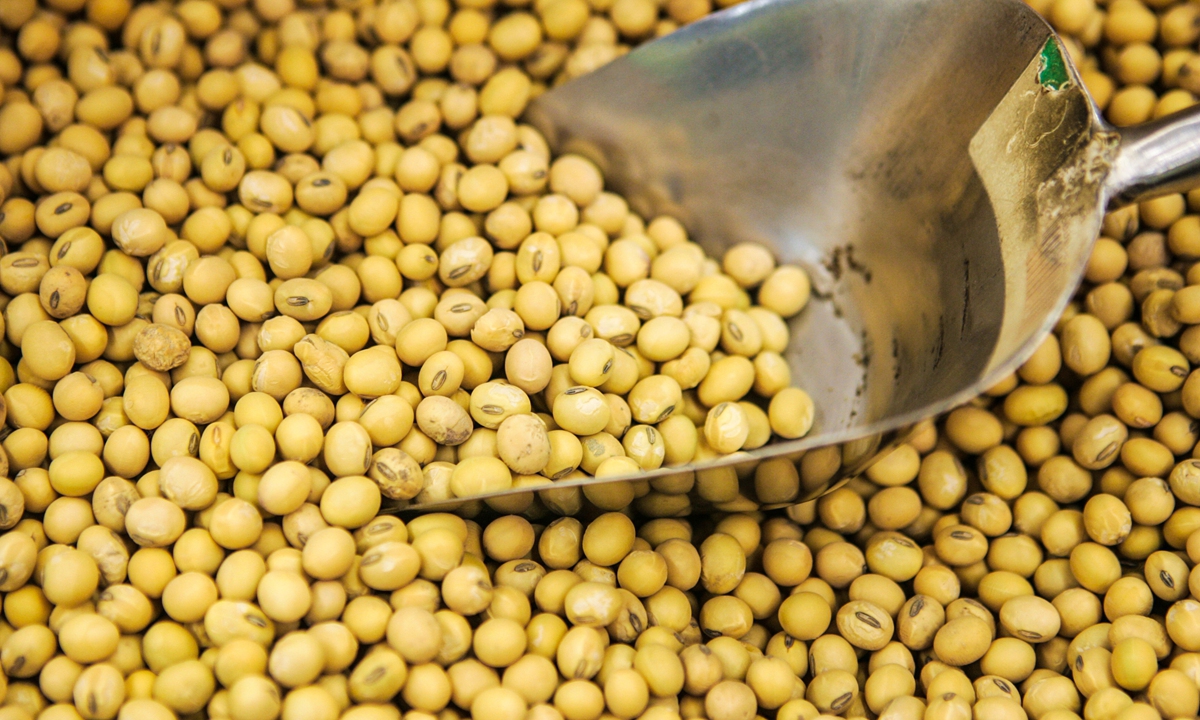
Soybean Photo: VCG
A shipment of 271.6 tons of Russian soybean arrived at Manzhouli Port in North China's Inner Mongolia Autonomous Region on Friday, the first of its kind since the launch of the New Land Grain Corridor, which connects China with the Eurasian Union countries including Russia.
The soybean imports from Russia are not only the latest indication of the strengthened win-win cooperation between China and Russia in farming trade but is also driven by the market need for diversifying sources of supplies for food security reasons, while reducing reliance on singular suppliers, particularly the US, experts said.
The shipment will be transported to Tianjin city where the product's oil will be extracted before entering the market.
With Russian soybean supply expected to increase considerably over the long term, some 8 million tons of Russian grain including soybean will arrive annually at the Manzhouli Port alone, injecting new impetus into bilateral trade ties, the Global Times learned.
China is a major soybean consumer while Russia is a large grain producer. The cooperation on soybeans has been highlighted since the signing of a development plan in 2019 between the two countries, covering a wide range of areas from planting to processing, research, development and trade.
Experts said that the new import channel from Russia is an important part of the trade facilitation between the two nations and marks the key direction for China's diversification of soybean imports.
The first shipment through Manzhouli Port marks a new milestone in China's grain import strategy and offshore farming cooperation, Kang Shuchun, a director of the China Federation of Logistics and Purchasing, told the Global Times on Sunday. Moreover, the new trade route is part of the pressing need to reduce reliance on a singular country, such as the US.
About 85 percent or nearly 100 million tons of domestically consumed soybeans are imported from overseas each year, with the US and Brazil being two major suppliers.
Given the high degree of dependence on foreign suppliers, it is necessary to increase soybean production capacity and domestic self-sufficiency rate, experts said.
"Importing soybeans from the Americas, especially the US, is not the best way given the changing geopolitical and economic landscape," Kang said, noting that soybean imports from Russia can hedge against a potential reduction of US food exports to China, and increase the security of China's food supply.
"At the same time, it helps to increase the status of the Chinese yuan in international cross-border settlement," the industry insider said.
Li Ziguo, a senior research fellow with the China Institute of International Studies, told the Global Times on Sunday said that there is an issue of security and stability of supply chains when it comes to trade between China and the US, because the US often creates problems in bilateral relations.
While the Russian soybeans will only account for a small amount of China's total imports, mainly due to the country's relatively low production capacity, there remains a potential to tap into future opportunities, because of the high quality of Russian soybeans.
In addition to high protein content, Russian soybeans are not genetically modified, which will be greatly welcomed by Chinese consumers, experts say.
Russia enjoys a strong political relationship with China, with the two countries sharing an extended land border. After the opening of more logistic lines including the Tongjiang-Nizhneleninskoye railway bridge, bilateral trade is now made easier and faster, Li said.




